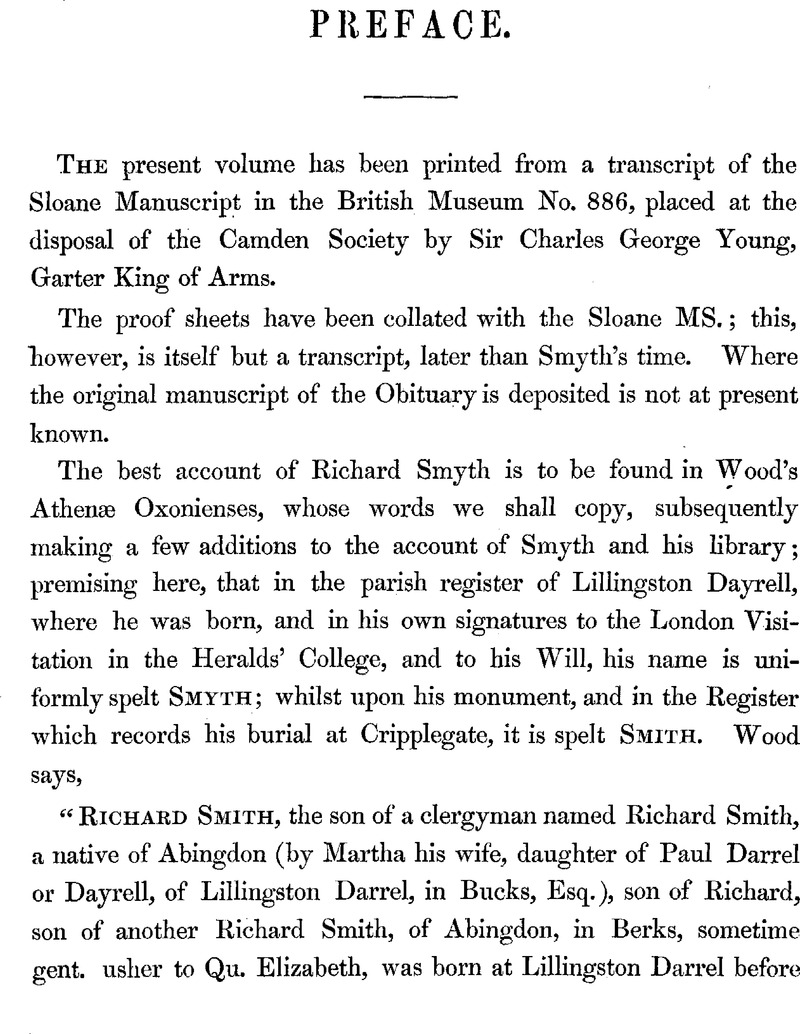No CrossRef data available.
Article contents
Preface
Published online by Cambridge University Press: 23 February 2010
Abstract

- Type
- Preface
- Information
- Copyright
- Copyright © Royal Historical Society 1849
References
page vi note * “Richard Smyth, the sonne of Richard Smyth, was baptized the 20. day of Sepr, an'o D'ni 1590.” Par. Reg. of Lillingston Dayrell.
page vi note † The following explanation of the history and functions of this office have been kindly supplied to the Editor by Mr. Serjeant Merewether, the present Town-Clerk of London.
” Sheriffs in Cities stand upon a different footing from those in Counties: London has the right to both: the right to elect two sheriffs for the city of London ; and, the county of Middlesex having by one of the early charters been granted to the citizens, the two sheriffs of London are the sheriff of Middlesex. For the County, they exercise their funetions, as in other counties, by an Tinder'-sheriff': but in the City it is otherwise : each sheriff was responsible for his own officers ; and therefore each sheriff had his own Compter or place where his officers accounted to the suitors for the debts they had received for them. These Compters were at last fixed in known places ; one in the Poultry, and the other in Wood Street. Instead of one under-sheriff for both Sheriffs, each had his officer, who was called a Secondary, or the sheriff's second. Hence these two officers, who continue to the present day, and each performs the functions of an under-sheriff, and also certain contested elections, ” The Secondaries are usually lawyers, and hence Smith would be well acquainted in his day with those of his craft. It is a highly respectable station, of much responsibility and of some authority. The two present secondaries are Mr. James and Mr. Potter : both highly respectable men. Their station is probably nearly analogous to the station of masters and prothonotaries in the courts of law.
”In 1644, 20th Cha. I. October the 3d, Sir Richard Stone was discharged as Secondary for Wood Street Compter, and another to be admitted by the court of aldermen to try the right and title by a legal course: and on Oct. the 30th in the same year Mr. Nathaniel Hayes was discharged as Secondary of the Poultry Compter for insufficiency, and another to be admitted in the same manner. On Oct. 15th in the same year Richard Smith was admitted as Secondary of the Poultry Compter, and John Reading for Wood Street. In 1655, eleven years after, Richard Smith surrendered up his place as Secondary of the Poultry Compter, and Edward Trotman was admitted in his place.” Edward Trotman's death is recorded in p. 88 of Smyth's Obituary.
page vii note * Little Britain, and Duck Lane in its immediate vicinity, were streets in which a large number of the London booksellers in Smyth's time were congregated. Of those who inhabited the former street, the reader will find notices in pp. 9, 10, 21, 23, 27, 28, 38, 43, 50, 55,61, 64, 66, 67, 69, 71,74, 77, 79, 83, 86, 91, 93, 96, 97, 99, 102, and 103 ; of those of the latter street, in pp. 17, 25, 34, 46, 54, 79, and 80. The entries of the deaths of booksellers in every part of London are numerous.
Little Britain and Duck Lane were the Paternoster Row and Creed Lane of modern times. Duck Lane is now Duke Street, Smithfield. The Ballards were the last of the old race of booksellers who inhabited Little Britain.
page ix note * Such a collection, in 2 small vols. 8vo. is now in the Library of the College of Arms, but whether the same is not quite clear. They were in 1691 the property of George Ince, and afterwards in the Collection of John Warburton, Somerset Herald.
page x note * Athenæ Oxon. edit. Bliss, vol. iii. col. 1031.
page xix note * Now, MS. Sloane, Brit. Mus. No. 1024.




